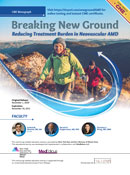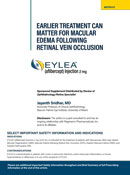Current estimates indicate that more than 50 percent of your age-related macular degeneration (AMD) risk is genetic. Why is AMD prevalence highest among fair-skinned individuals of European descent?
Dr. Robert Avery, a friend and colleague, has proposed a captivating theory.1 During the Middle Ages and peaking in the mid-1300s, the plague, or Black Death, ravaged continental Europe and reduced world population from 450 to 350 million. During this time, infection with Yersinia pestis had a mortality rate of about 50 percent. Intriguingly, complement polymorphisms, specifically the Y402H allotype of Complement Factor H, may enhance an individual’s ability to identify and eradicate Yersinia pestis. Such polymorphisms may have conferred a survival benefit to those facing the plaque, thereby creating a strong selection pressure in affected populations. As life expectancy subsequently increased, collateral effects of these enriched genetic alterations have become apparent in increasing AMD risk.
Similar theoretical genetic links between other medical maladies and infectious diseases, including sickle cell disease and malaria, are fascinating and may shed light on human circumstances over thousands of years.
As our understanding of AMD genetics has advanced, so has our ability to treat associated neovascularization, raising new questions. For example, does VEGF blockade affect the development or progression of macular atrophy?
In this issue, we explore the role of genetic testing and the relationship between anti-VEGF treatment and macular atrophy, pertinent issues for our management of AMD patients and their families, whose younger generations are often concerned about their personal AMD risk.
My mother has intermediate dry AMD and my grandmother may have been blind from AMD. While I have not undergone formal genetic testing, I likely harbor some of the AMD genetic polymorphisms discussed in these pages. I wonder if my immune system could withstand a bout with Yersinia, and I wonder when data will indicate is the time for me to systematically offer genetic testing to my patients and their families.





